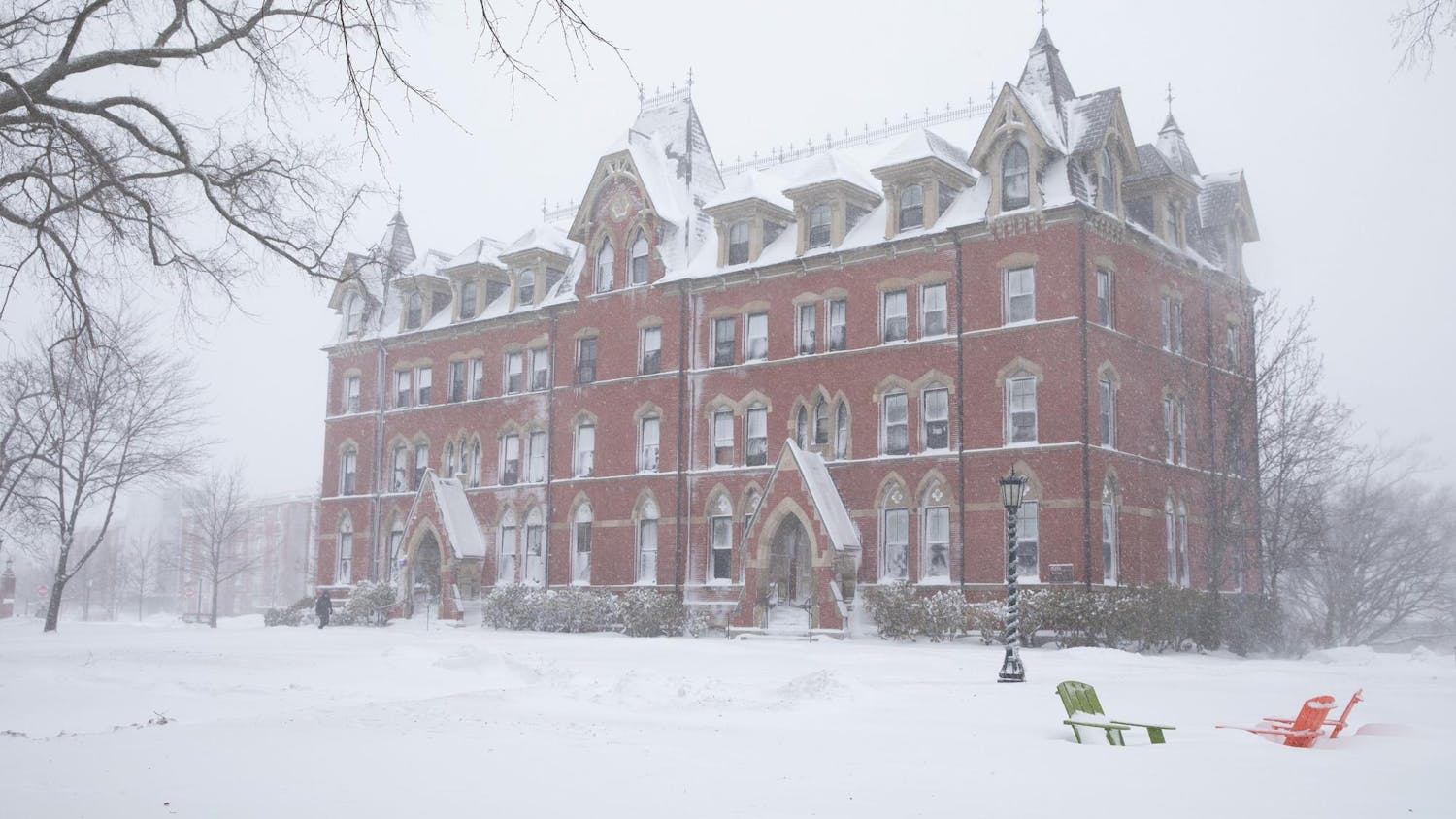Editor’s note: Mouhab Rizkallah, owner of LaCourt Realty LLC, sued Alexander Janoff, the Daily’s editor in chief, and Emily Thompson, a deputy news editor, in March 2022 over the Daily’s coverage of the LaCourt Tenants Union. The case was later dismissed with prejudice. Janoff and Thompson were not involved in the reporting or writing of this article.
In February, members of the LaCourt Tenants Union, an organization of LaCourt Realty LLC tenants and community supporters, protestedLaCourt’s lawsuit against a former tenant, Alona Brosh, who the company sued for $28,875 of “unpaid rent.” Since then, the LCTU has continued organizing against evictions and rent increases, claiming LaCourt — which has roughly 3,000 tenants in the Greater Boston area — has continued to raise rents during the pandemic. LaCourt acknowledges that its prices have risen with inflation but says it has made efforts to absorb costs on tenants’ behalf. The LCTU is also monitoring ongoing legal proceedings between Brosh and LaCourt.
The LCTU’s current work
LCTU organizer Thane Hale explained why the union is concentrating on rent increases.
“What is going to materially hurt tenants the most is the increasing rate of rent, which is ongoing,” Hale said.
Mouhab Rizkallah, owner of LaCourt as well as The Braces Place in Somerville, addressed the subject of rent increases in an email to the Daily.
“LaCourt Realty believes in affordable housing, and recognizes that the world population has doubled in the past 50 years,” Rizkallah wrote. “Until high density zoning and streamlined permitting is established by City leaders, housing costs will continue to rise.”
Rizkallah further outlined LaCourt’s response to rising inflation.
“With 3 tenant exceptions, LaCourt has absorbed about 50% of the past three years’ inflationary costs, and offered lease renewals at rents below what the market would bear,” Rizkallah wrote. “Despite that increased profit opportunity, LaCourt has restrained its profitability on existing tenants, because LaCourt genuinely likes most of its tenants, and understands that tenants need help getting through this difficult time.”
Halting evictions and rent increases were the top two demands the LCTU made of LaCourt in February 2020. The demand letter that the union sent to Rizkallah also called for improved maintenance and access to free, functional washing machines and dryers for all tenants.Hale said that the demand for washers and dryers remains salient for tenants in 2022. He added that “maintenance is slightly better” today than it was before, although “it’s still not up to the best standard.”
Tenants diverge in their characterization of LaCourt
Hale connected the Daily with three current and former LaCourt tenants, including Brosh, who discussed their experience with the management group.
A current LaCourt tenant who wished to remain anonymous explained that they have had two maintenance issues with LaCourt. They said one of their issues was quickly fixed, but LaCourt blamed the other one on the tenants and took several weeks to resolve it.
An anonymous former tenant agreed that LaCourt’s responsiveness was mediocre, noting that they did not experience many maintenance issues.
“It's kind of 50-50 — they do about half the things … we requested,” they told the Daily.
This former tenant also expressed frustration with LaCourt’s false advertising of free laundry to potential new tenants.
Rizkallah put the Daily in contact with two current LaCourt tenants who say they have had positive experiences with the company.
“I’ve never personally had an issue with LaCourt, and they’ve always been good to me as a tenant,” tenant Rob Hamilton wrote in an email to the Daily.
Dana Cechinio, another tenant, said LaCourt treats its tenants well.“They have nice apartments and have always been responsive,” Cechinio wrote in an email to the Daily.
Brosh countered that LaCourt refused to fix a crack in her window, opting instead to put tape over it.
“Good housing is a right,” the anonymous current tenant wrote in an email to the Daily. “If you can’t provide excellent housing to 3,000 tenants then you shouldn’t have 3,000 tenants.”
LaCourt’s lawsuits against tenants
Hale said that aside from what he sees as LaCourt’s property maintenance and administration shortcomings, LaCourt abuses its power by suing its tenants.
“[Rizkallah is] just very litigious,” Hale said. “And in fact, this is what is impinging on our organizing. [Litigation is] their strategy to keep tenants from coming to the press, from going to the government or just organizing generally. It can be really intimidating.”
LaCourt has active lawsuits against Brosh and Michael Ventura, another former tenant.
Brosh echoed Hale’s frustration over the lawsuits, highlighting the vulnerability tenants experience as defendants.
“There’s no lawyer who’s going to fight for tenants,” Brosh said. “Truthfully, we’re the ones who need protecting. We don’t have the resources that landlords do."
Hale emphasized the importance of the LCTU as a community and social organization. He explained that the union primarily wants to set up meetings with members, organize social events and engage in dialogue with LaCourt. He stressed the LCTU’s aversion to and frustration with the current legal aspects of its work.
“It's so stressful to have these lawsuits hanging over you,” Hale said. “But on the other hand, we know what we’re doing is right. And what is required of us to do what’s right can be a lot.”
Brosh and LaCourt in ongoing litigation
Hale said that the LCTU is also involved in advocacy on behalf of two former tenants, including Brosh.
Brosh, whom LaCourt is currently suing in the Somerville District Courtfor “unpaid rent,” said that in May 2020 the realty company informed her and other tenants that they were expected to keep paying rent despite pandemic conditions. Brosh had recently lost her job.
Soon after, LaCourt sent Brosh and her two roommates an “intent to renew” letter to sign. Brosh said her memory and understanding of the letter was thatit would constitute a lease only if all three of them signed. She signed the letter, but her two roommates did not, at which point she began searching for new roommates.
Brosh claims she found at least seven candidates to fill the rest of her unit, including one who sent LaCourt a money order for their $50 background check fee, but that LaCourt took too long to process the background check, causing the prospective housemate to look for housing elsewhere.
“I made a good faith effort to find roommates and LaCourt … dragged their feet and I lost out on a lot of candidates during a pandemic when people were not keen to move,” Brosh said.
At that point, a few days before the upcoming lease cycle and unable to find roommates, Brosh decided not to renew her lease with LaCourt. She claims LaCourt sent her a lease to sign for the upcoming lease cycle nine times, and that she declined to do so each time.
Rizkallah contradicted Brosh’s recollection of events.
“[Brosh] informed LaCourt that she was not going to renew, and LaCourt rented her space to new tenants,” Rizkallah wrote. “[Brosh] then desperately asked LaCourt to let her renew her lease, and LaCourt reminded her that she did not have roommates. She indicated to LaCourt that she would take the responsibility to find roommates, and she begged LaCourt to accept her ‘intent to renew’ form.”
“LaCourt was frustrated because LaCourt now had to disappoint the new tenants that wanted the apartment,” Rizkallah wrote. “Two months later, the day before the new lease was due to begin, Ms. Brosh shockingly indicated to LaCourt that she could not find roommates and would be exiting the space. Her behavior was egregious negligence that hurt others, violated a binding contract, and LaCourt held her legally accountable for this.”
Brosh explained her decision not to renew her lease.
“I was unemployed because of the pandemic,” she explained. “I did not have the income to support my living there by myself,” Brosh said. “That was not a possibility. And also, I did not want to live there anymore, because it was not kept up to date.”





